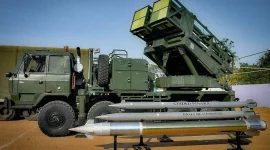Mr. Baba Kalyani, Chairman and Managing Director of Bharat Forge, has strongly advocated for a collaborative approach involving private companies, public sector undertakings, and academic institutions to develop indigenous aero engines.
Speaking on Republic TV, Mr. Kalyani highlighted the Indian industry's readiness to invest in advanced technology and sophisticated weapon systems, emphasizing that such a partnership is essential for India to achieve genuine self-reliance in the critical aerospace sector.
"Indian Industry committed to invest in #technology and developing advanced weapon platforms. Industry Consortia, a must, to develop #MadeinIndia Aero Engines," Mr. Kalyani stated.
This vision comes at a time when India is keen to strengthen its aerospace capabilities, particularly in aero engine technology, a field crucial for national defence.
India's aerospace industry has achieved notable successes, including the Tejas Light Combat Aircraft, the Dhruv Advanced Light Helicopter, and the Akash surface-to-air missile system, all of which demonstrate the nation's increasing technological capabilities.
However, the country still faces a significant challenge in developing high-performance aero engines. This area is currently dominated by a few global corporations, leading India to rely on imported engines for many of its key aircraft, such as the GE F404 for the Tejas Mk-1 and the AL-31FP for the Su-30 MKI.
This reliance can lead to strategic concerns regarding supply chain security and long-term maintenance expenses.
The Prime Minister's Atmanirbhar Bharat (Self-Reliant India) initiative places a strong emphasis on domestic defence manufacturing, aiming for $25 billion in defence exports by 2030. Aero engines, often considered the core of any combat aircraft, are central to this national goal.
The Defence Research and Development Organisation (DRDO) and private firms like Bharat Forge are actively working to address this technological gap. Mr. Kalyani's recent call for unified action underscores the importance of this mission, especially following recent geopolitical events, including Operation Sindoor earlier in May 2025, which underscored the need for robust air power.
Mr. Kalyani, leading Bharat Forge, a company with a global footprint in forging and advanced manufacturing, brings considerable experience to this initiative. His company has expanded its operations into the defence sector, supplying vital components for major artillery systems like the Advanced Towed Artillery Gun System (ATAGS) and contributing to India's missile development programs.
His proposal for industry consortia offers a practical strategy to overcome the substantial technological and financial hurdles associated with aero engine development.
The Case for Collaborative Consortia
Developing aero engines is an extraordinarily complex engineering feat, demanding deep expertise in fields such as metallurgy, aerodynamics, thermal management, and sophisticated digital control systems.Creating a jet engine from the ground up typically requires investments running into billions of dollars, extensive research spanning decades, and access to highly advanced materials like single-crystal turbine blades and ceramic matrix composites.
No single Indian entity, whether public or private, currently possesses the entire range of capabilities required to match established global leaders.
Mr. Kalyani’s proposal for industry consortia outlines a cooperative framework where:
- Private Industry (e.g., Bharat Forge, Tata Advanced Systems, Mahindra Defence) would contribute manufacturing prowess, supply chain management, and financial investment.
- Public Sector Undertakings (e.g., Hindustan Aeronautics Limited, Gas Turbine Research Establishment) would offer infrastructure, testing facilities, and specialised domain knowledge.
- Academic Institutions (e.g., Indian Institutes of Technology, Indian Institute of Science) would spearhead fundamental research in materials science and propulsion technologies.
- Startups and Small to Medium Enterprises (SMEs) would drive innovation in specialised areas like additive manufacturing (3D printing) and AI-assisted design optimisation.
Mr. Kalyani's vision is also in harmony with India's Defence Production and Export Promotion Policy (DPEPP) 2020, which promotes public-private partnerships to foster technological independence.
Bharat Forge is well-suited to play a leading role in such consortia due to its specialisation in high-precision forging and advanced materials. The company's Kalyani Centre for Technology and Innovation (KCTI) has developed significant capabilities in processing titanium and superalloys, which are essential for manufacturing critical aero engine parts like compressor blades and turbine discs.
Furthermore, Bharat Forge's joint ventures, including one with Safran for landing gear components, showcase its capacity to collaborate effectively with global industry leaders while simultaneously building domestic expertise.
Mr. Kalyani's stress on technological investment is reflected in Bharat Forge’s ongoing research and development activities, including partnerships with DRDO’s Gas Turbine Research Establishment (GTRE) to support the indigenous Kaveri engine program.

